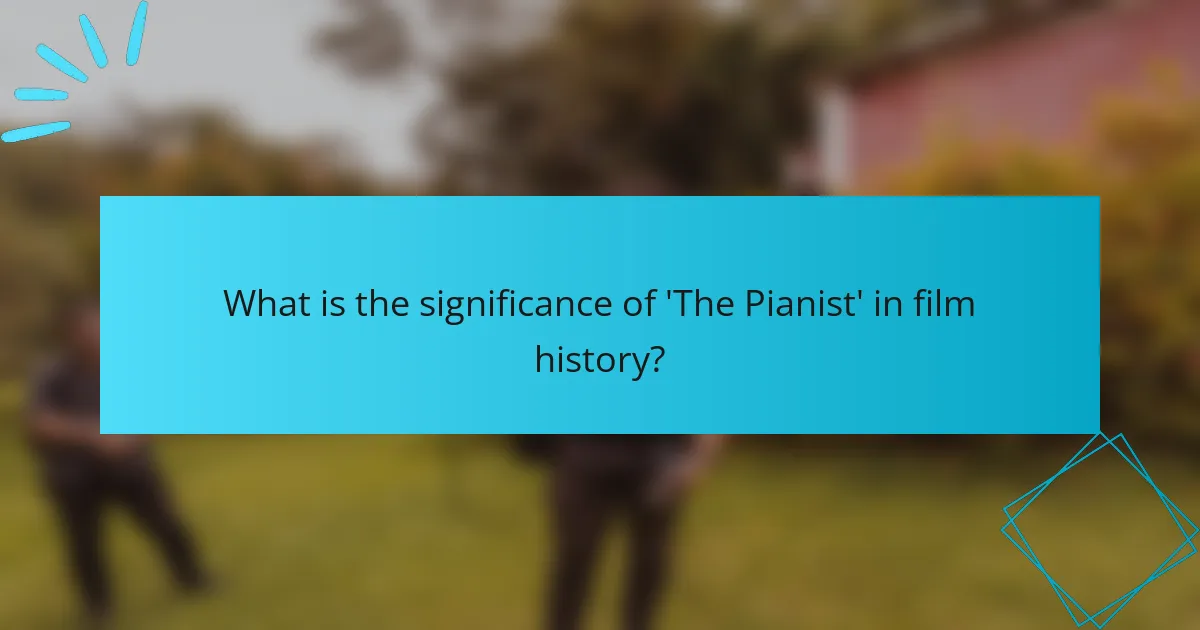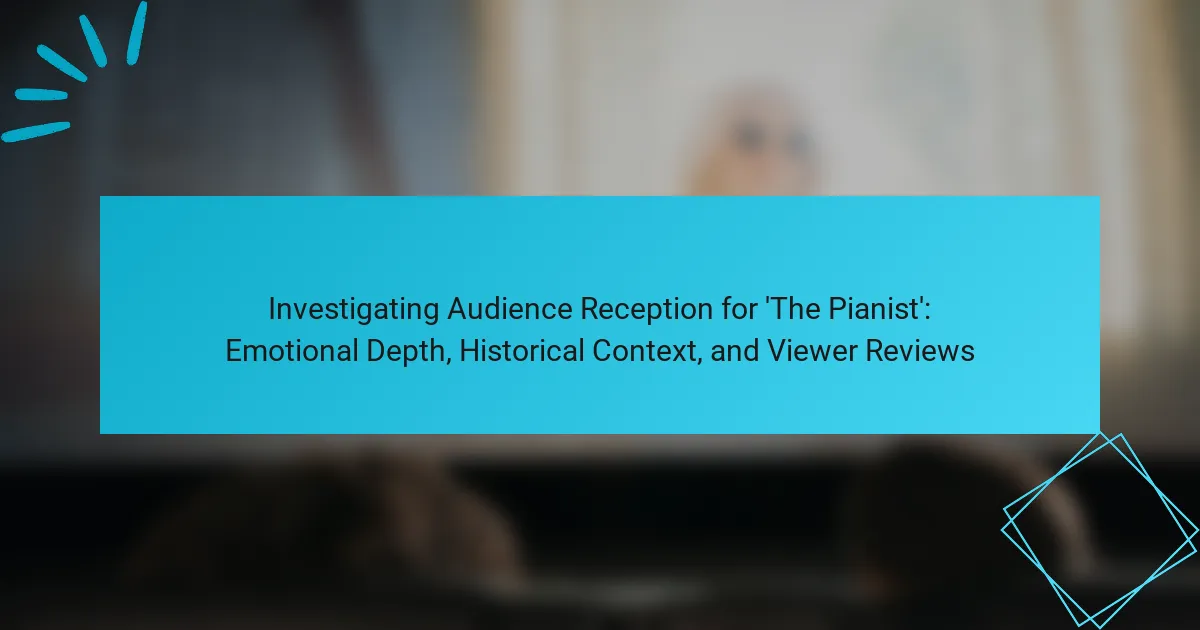
What is the significance of ‘The Pianist’ in film history?
‘The Pianist’ is significant in film history for its powerful portrayal of the Holocaust. The film, directed by Roman Polanski, is based on the autobiography of pianist Władysław Szpilman. It highlights the struggle for survival during World War II in Warsaw. The film received critical acclaim, winning the Palme d’Or at the 2002 Cannes Film Festival. It also earned three Academy Awards, including Best Director for Polanski. The cinematography and score enhance the emotional depth of the narrative. ‘The Pianist’ serves as an important reminder of the atrocities of war and the resilience of the human spirit. Its historical context and artistic execution contribute to its lasting impact on audiences and filmmakers alike.
How does ‘The Pianist’ portray emotional depth?
‘The Pianist’ portrays emotional depth through its depiction of survival and the human spirit amid adversity. The protagonist, Władysław Szpilman, experiences profound loss and isolation during the Holocaust. His struggles highlight the fragility of life and the resilience required to endure such trauma. The film uses stark visuals and haunting music to evoke feelings of despair and hope. Szpilman’s emotional journey is accentuated by moments of vulnerability and connection with others. The cinematography captures his isolation in a war-torn Warsaw, enhancing the viewer’s emotional engagement. Additionally, the film’s historical context adds weight to Szpilman’s experiences, making his story resonate deeply with audiences. The portrayal of his passion for music serves as a powerful symbol of hope and survival.
What specific scenes exemplify the emotional impact of ‘The Pianist’?
The emotional impact of ‘The Pianist’ is exemplified in several key scenes. One significant scene occurs when Władysław Szpilman plays the piano for the German officer. This moment highlights the power of music amidst despair. Another poignant scene is when Szpilman witnesses the destruction of the Warsaw Ghetto. This visual representation of loss deepens the viewer’s emotional response. Additionally, the scene where Szpilman hides in the abandoned building captures his isolation and fear. These scenes collectively convey the profound emotional weight of survival and loss during the Holocaust. Each moment is crafted to evoke empathy and reflection on human suffering.
How do the characters’ experiences contribute to the film’s emotional layers?
The characters’ experiences in ‘The Pianist’ deepen the film’s emotional layers by showcasing resilience and suffering. Each character faces unique challenges that reflect the harsh realities of war and survival. For instance, Władysław Szpilman’s struggle for survival highlights the human spirit’s endurance amid despair. His emotional journey resonates with viewers, evoking empathy and connection. Supporting characters, like his family, illustrate the devastating impact of loss and separation. Their experiences amplify the film’s themes of isolation and hope. The raw portrayal of these experiences creates a profound emotional landscape, enhancing audience engagement.
What historical context surrounds the creation of ‘The Pianist’?
‘The Pianist’ was created against the backdrop of World War II and the Holocaust. The film, directed by Roman Polanski, is based on the autobiography of Polish-Jewish pianist Władysław Szpilman. It depicts Szpilman’s harrowing experiences during the Nazi occupation of Poland. The historical context includes the systematic persecution of Jews, which culminated in the Holocaust, leading to the deaths of approximately six million Jews. The film highlights the resilience of the human spirit amidst extreme adversity. It was released in 2002, shortly after a resurgence of interest in Holocaust narratives in cinema. This context influenced both the storytelling and the audience’s reception, evoking deep emotional responses.
What events inspired the storyline of ‘The Pianist’?
The storyline of ‘The Pianist’ is inspired by the true experiences of Władysław Szpilman. Szpilman was a Polish-Jewish pianist and composer during World War II. His life was profoundly affected by the Holocaust and the Nazi occupation of Poland. The film depicts his struggle for survival amidst the horrors of war. Szpilman’s story includes his escape from the Warsaw Ghetto and his efforts to evade capture. His experiences highlight the resilience of the human spirit in dire circumstances. The film is based on his autobiography, which provides detailed accounts of his life during this tumultuous period.
How does the film reflect the historical realities of its time?
The film “The Pianist” reflects the historical realities of its time by accurately depicting the experiences of Jews during the Holocaust. It showcases the brutal conditions faced by individuals in Warsaw during World War II. The protagonist, Władysław Szpilman, embodies the struggle for survival amidst persecution. The film’s portrayal of the ghetto’s destruction aligns with documented historical events. It illustrates the impact of Nazi policies on daily life, supported by survivor testimonies and historical records. The use of authentic locations enhances the film’s realism. Furthermore, it highlights the resilience of the human spirit in dire circumstances, resonating with actual accounts from that era.
What are the key themes explored in ‘The Pianist’?
The key themes explored in ‘The Pianist’ include survival, the impact of war, and the power of music. Survival is central as the protagonist, Władysław Szpilman, navigates the horrors of World War II. The film highlights the brutality of the Holocaust and the struggle for existence. The impact of war is depicted through the destruction of Warsaw and the loss of human life. The film illustrates how war affects individuals and communities. Additionally, the power of music serves as a source of hope and resilience. Szpilman’s piano playing becomes a means of emotional expression and survival. These themes resonate with audiences, emphasizing the human spirit’s endurance in the face of adversity.
How do themes of survival and resilience manifest in the film?
Themes of survival and resilience manifest in the film through the protagonist’s struggle to endure during the Holocaust. Władysław Szpilman faces constant threats to his life and freedom. His resourcefulness allows him to navigate the dangers of wartime Warsaw. The film highlights his determination to survive against overwhelming odds. Szpilman’s experiences reflect the broader human capacity for resilience in extreme adversity. The cinematography emphasizes moments of isolation and despair, contrasting with fleeting instances of hope. His connection to music serves as a lifeline, grounding him amid chaos. This portrayal resonates with audiences, illustrating the strength of the human spirit.
What role does music play in conveying the film’s themes?
Music plays a critical role in conveying the themes of the film “The Pianist.” It enhances emotional depth and emphasizes the character’s struggles. The score underscores pivotal moments, creating a poignant atmosphere. For example, the use of Chopin’s compositions reflects the protagonist’s inner turmoil and resilience. This connection between music and emotion supports the narrative’s historical context. The film’s sound design also contrasts silence with music, highlighting moments of despair and hope. Thus, music serves as a powerful tool for thematic expression in “The Pianist.”

How has ‘The Pianist’ been received by audiences and critics?
‘The Pianist’ has been well received by both audiences and critics. The film holds a 95% approval rating on Rotten Tomatoes based on critic reviews. Audience scores also reflect high appreciation, with an 88% rating. Critics praised Adrien Brody’s performance, which earned him an Academy Award for Best Actor. The film’s emotional depth and historical accuracy resonated with viewers. Many reviews highlighted its powerful storytelling and poignant depiction of survival during the Holocaust. The combination of strong direction and compelling performances contributed to its acclaim. Overall, ‘The Pianist’ is regarded as a significant cinematic achievement.
What are the general viewer reviews of ‘The Pianist’?
General viewer reviews of ‘The Pianist’ are overwhelmingly positive. Audiences praise its emotional depth and powerful storytelling. Many viewers highlight the exceptional performance by Adrien Brody. They note his portrayal of Władysław Szpilman as moving and authentic. The film’s direction by Roman Polanski receives commendations for its sensitivity. Viewers appreciate the historical accuracy and the depiction of the Holocaust. Critics and audiences alike recognize the film’s artistic cinematography. Overall, ‘The Pianist’ resonates deeply with viewers, earning it a strong reputation in cinematic history.
How do audience ratings compare to critical reviews?
Audience ratings often differ significantly from critical reviews. Critics tend to focus on technical aspects and artistic merit. Audience ratings reflect personal enjoyment and emotional connection. For example, ‘The Pianist’ received high audience scores, indicating strong viewer appreciation. In contrast, some critics offered mixed reviews, citing pacing issues. This disparity highlights the subjective nature of film appreciation. Audience ratings can sometimes be higher due to emotional resonance. Critics may prioritize different criteria, leading to varied assessments.
What specific aspects do viewers praise or criticize?
Viewers praise the emotional depth and authenticity of ‘The Pianist.’ Many highlight the powerful performances, particularly Adrien Brody’s portrayal of Władysław Szpilman. Critics often mention the film’s haunting cinematography and realistic depiction of wartime experiences. Some viewers, however, criticize the pacing, stating it drags in certain sections. Others feel the film lacks character development for supporting roles. The historical accuracy is both praised and scrutinized, with some viewers questioning specific events depicted. Overall, audience reception reflects a mix of admiration for its artistic elements and critiques regarding narrative flow.
What impact has ‘The Pianist’ had on its audience?
‘The Pianist’ has profoundly impacted its audience by evoking deep emotional responses. Viewers report feelings of empathy and sorrow for the protagonist’s struggles. The film’s portrayal of the Holocaust raises awareness about historical atrocities. Audiences often reflect on themes of survival and resilience. Critics highlight its realistic depiction of suffering, which resonates with many. The film has sparked discussions about human rights and the importance of remembrance. Its artistic merit has garnered numerous awards, further validating its impact. Overall, ‘The Pianist’ serves as a poignant reminder of the human condition.
How do personal stories of viewers reflect the film’s influence?
Personal stories of viewers reflect the film’s influence by showcasing emotional connections and personal transformations. Many viewers report feeling a deep empathy for the protagonist, which highlights the film’s ability to evoke strong emotions. For instance, individuals have shared how the film prompted them to reflect on their own family histories and experiences of trauma. This connection can lead to discussions about resilience and survival, emphasizing the film’s impact on personal narratives. Research indicates that films like ‘The Pianist’ often serve as catalysts for viewers to confront their own feelings and histories. Such reflections can manifest in community discussions, online forums, and personal testimonials, reinforcing the film’s lasting influence on its audience.
What emotional responses have been documented from audiences?
Audiences have documented a range of emotional responses to ‘The Pianist’. Common reactions include sadness, empathy, and admiration. Viewers often feel profound sadness due to the tragic circumstances depicted in the film. Empathy arises from the portrayal of suffering and resilience. Many audience members express admiration for the protagonist’s strength and artistry. Reviews highlight a visceral connection to the character’s plight. The film’s historical context amplifies these emotional responses. Critics note that the authenticity of the narrative evokes deep reflection on human experiences during wartime. Overall, the emotional depth of ‘The Pianist’ resonates strongly with its audience.

What lessons can be drawn from the audience reception of ‘The Pianist’?
The audience reception of ‘The Pianist’ highlights the importance of emotional storytelling in film. Viewers responded strongly to the film’s portrayal of suffering and resilience during the Holocaust. The film’s authenticity resonated, as it was based on true events and personal experiences. Audience reviews often emphasized the powerful performances, particularly Adrien Brody’s portrayal of Władysław Szpilman. Many viewers reported a profound emotional impact, leading to discussions about the human capacity for survival. The film’s historical context provided a deeper understanding of the atrocities faced during World War II. This reception underscores the effectiveness of combining personal narratives with broader historical themes. Overall, the lessons drawn include the significance of emotional engagement and the impact of historical accuracy in storytelling.
What can filmmakers learn from the reception of ‘The Pianist’?
Filmmakers can learn the importance of emotional authenticity from the reception of ‘The Pianist.’ The film received acclaim for its raw portrayal of human suffering and resilience. Audiences connected deeply with the protagonist’s struggles. This connection highlighted the value of genuine storytelling in cinema. Critics praised the film for its historical accuracy and emotional depth. The reception demonstrated that audiences appreciate films that evoke strong emotional responses. Additionally, the success of ‘The Pianist’ illustrates how historical context can enhance narrative impact. Filmmakers should consider these elements when crafting their stories to resonate with viewers.
How can emotional depth enhance audience engagement in films?
Emotional depth enhances audience engagement in films by creating a strong connection between viewers and characters. When characters experience profound emotions, audiences can empathize with their struggles. This empathy fosters a sense of investment in the story. Research shows that films with high emotional depth often lead to greater viewer satisfaction. For instance, studies indicate that emotionally resonant films score higher in audience ratings. Additionally, emotional narratives can elicit physiological responses, such as increased heart rate and tears. These responses further immerse viewers in the cinematic experience. Thus, emotional depth is a crucial element in engaging audiences effectively.
What strategies can be employed to effectively convey historical context in cinema?
Employing accurate historical research is essential to convey historical context in cinema. Filmmakers should utilize primary sources, such as diaries and letters, to capture authentic experiences. Incorporating expert consultations, like historians or cultural scholars, can enhance accuracy. Visual elements, such as costumes and set designs, must reflect the era authentically. Cinematic techniques, like color grading and sound design, can evoke the period’s mood. Contextualizing events through character dialogue can provide clarity to the audience. Flashbacks or archival footage can illustrate historical events effectively. Lastly, including historical disclaimers can inform viewers about the film’s creative liberties.
How can viewers apply insights from ‘The Pianist’ to their viewing experiences?
Viewers can apply insights from ‘The Pianist’ by reflecting on the emotional depth portrayed in the film. Understanding the character’s struggles enhances empathy towards real-life historical events. The film’s historical context allows viewers to appreciate the impact of war on individuals and society. Analyzing the cinematography and music deepens appreciation for artistic choices. Viewers can also engage in discussions about resilience and survival themes presented in the film. Recognizing the psychological effects of trauma depicted can lead to a more profound viewing experience. Engaging with viewer reviews can provide diverse perspectives, enriching personal interpretations. Overall, these insights cultivate a more meaningful connection to the film’s narrative and themes.
What tips can enhance emotional connection with films like ‘The Pianist’?
To enhance emotional connection with films like ‘The Pianist’, viewers should engage deeply with the character’s journey. Understanding the historical context enriches the viewing experience. Research the time period and events depicted in the film. This knowledge creates a more profound connection to the characters’ struggles.
Additionally, focusing on the film’s music can evoke strong emotions. ‘The Pianist’ features powerful compositions that amplify the narrative’s emotional weight. Paying attention to the cinematography also enhances emotional engagement. The visual storytelling often reflects the characters’ internal states.
Finally, discussing the film with others can deepen emotional insights. Sharing perspectives can reveal different interpretations and emotional responses. Engaging with the film on multiple levels fosters a richer emotional connection.
How can understanding historical context enrich film appreciation?
Understanding historical context enhances film appreciation by providing insights into the societal influences that shape a film’s narrative and themes. Films reflect the time period in which they are created, including cultural, political, and social dynamics. For example, ‘The Pianist’ is set during World War II, illustrating the impact of war on individual lives. Recognizing this context allows viewers to grasp the emotional weight of the characters’ experiences. Additionally, historical knowledge can reveal the motivations behind a filmmaker’s choices. This deeper comprehension fosters a more profound connection with the film, enriching the overall viewing experience.
The main entity of the article is ‘The Pianist’, a film directed by Roman Polanski that explores the Holocaust through the true story of pianist Władysław Szpilman. The article examines audience reception, focusing on the film’s emotional depth, historical context, and viewer reviews. Key discussions include the portrayal of survival and resilience, the impact of music, significant scenes that evoke emotional responses, and the overall critical acclaim received by the film. Insights into how viewers connect with the film’s themes and the lessons filmmakers can learn from its reception are also highlighted.
